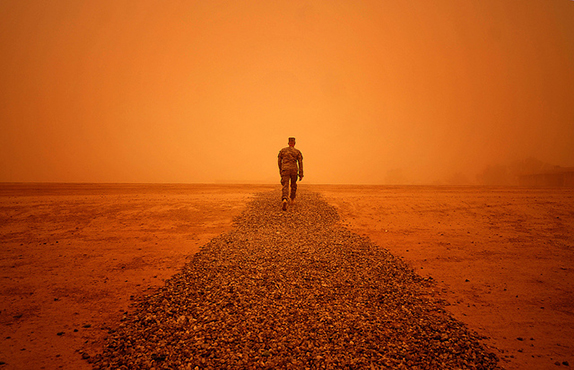
On the eve of the 9/11 anniversary of the terror attacks on the World Trade Center and the Pentagon—attacks that launched the U.S. on three wars, against al-Qaeda, Saddam Hussein and the Taliban—President Barack Obama went on prime-time television to announce a fourth war. It says something about the uncertainty of this new war that the U.S. can’t even agree on the name of the outfit we are fighting: ISIS, ISIL or the Islamic State.
The goal, or at least the vocabulary, of this new war seems modest, in Obama’s words “to degrade and ultimately destroy” ISIL. It is those two words “degrade” and “ultimately” that are intended to differentiate Obama’s war from the bluster of his predecessor’s three wars. Whether that is a distinction without a difference remains to be seen.
This fourth round of post-9/11 warfare creates something of a quandary for those who support Obama and what he has tried, but largely failed, to do as president, as well as for those who believe the radical Islamist movement that has conquered northwestern Syria and northeastern Iraq is a challenge that the U.S. should take on.
But Obama’s war speech is an altogether different matter, for it leaves in its wake profound doubts, even in his own administration, that his policy has much chance of success.
In trying to make the case that the U.S. is up to this newest challenge, Obama cited such past “successes” as Yemen, Somalia and the Ukraine. From a more objective point of view, however, all three efforts more closely resemble failures than successes. We became heavily involved in Yemen at least 14 years ago when al-Qaeda operatives sank the U.S.S. Cole. We have had planes, ships, spies and soldiers in Somalia since President George H.W. Bush first committed them in in the late 1980s. Yet both countries are more chaotic, ungovernable and impoverished—in every sense worse off—now than when we first intervened, and there is no sign that they will recover anytime soon. Ukraine has been another disaster, with Russia showing the world that it is free to work its will on an independent country in open defiance of the United States, NATO and the European Union. With successes such as Yemen, Somalia and the Ukraine, who needs failures?
The reason these efforts have failed and that the newest campaign is likely to follow suit is that we are trying to do on the cheap what can only be successfully accomplished with great effort and the expenditure of considerable blood and treasure over many years. These are more or less permanent wars, forever wars.
An even more disturbing criticism of Obama’s speech is that it was dishonest. His strategy relies largely on an easy, bloodless war, fought almost entirely from the air. Wars cannot be fought and won from the air; and no war is either easy or bloodless, unless the foe is just a clique of politicians in Grenada. Obama surely knows better but for domestic political reasons cannot say so.
An effective air campaign requires spotters, controllers and intelligence agents on the ground, and even then in a guerrilla war most military targets are heavily camouflaged amid civilian neighborhoods. Separating out the bad guys from the bystanders and even from the good guys is no easy matter and cannot be done from 30,000 feet or even by a drone pilot flying in a computer lab in the Nevada desert.
“We can’t erase every trace of evil from the world,” Obama confessed. To his credit this was his only use of the much abused word evil, although Secretary of State John Kerry, who is talking as if he is commander in chief of this new war, has not been so restrained. The trouble with associating a foe with evil, as both Ronald Reagan and the younger Bush had a penchant for doing, is that it makes no sense. That the Islamic State has done horrible deeds is beyond questioning. But so have all sides in the conflicts in Iraq and Syria. So has the U.S., for that matter.
The issue in the Middle East is not who is most evil but what kind of world we can live with and what we are prepared to do to create it.
For decades, going back a least to the Vietnam conflict, we have proclaimed ambitious goals and then produced modest, entirely inadequate means to achieve them. We never seem to learn that means and ends need to be proportional to each other. Of course, as the younger Bush liked to say, we want to rid the world of evil, or as Woodrow Wilson said, to make the world safe for democracy. But we are no more interested in committing millions of ground troops now than the Congress was in entering the League of Nations a century ago.
American leaders are conscious of the reluctance, even outright refusal, of the American public to commit to foreign deeds and adventures, whether great or petty. Eisenhower and Reagan in Lebanon, Kennedy in Cuba, Carter in Iran and Clinton in Somalia all decided flight was the better part of valor as soon as the going got heavy.
Like all his predecessors, Obama decided to sugarcoat the bitter pill of sacrifice. We can do it, they and he suggested, without great pain: just fly over a few dozen planes and drones, sneak in a handful of special forces, donate a few shiploads of arms and ammunition, and all will be for the best in the best of all possible worlds, as Voltaire wrote in Candide.
But there is no reason to believe all will be for the best or even better. Perhaps we may be able to avert the worst, and maybe avoiding the worst is the most that is possible. For myself, I wish that for once a president would be honest with us, would shun false hopes and easy solutions and say frankly that if we as a nation are not willing to do what it would take to achieve our objectives, then we must be satisfied with less, with a world that will constantly disappoint our hopes and frustrate our desires.
(Photo by DVIDSHUB)



Responses to “The Fourth War”